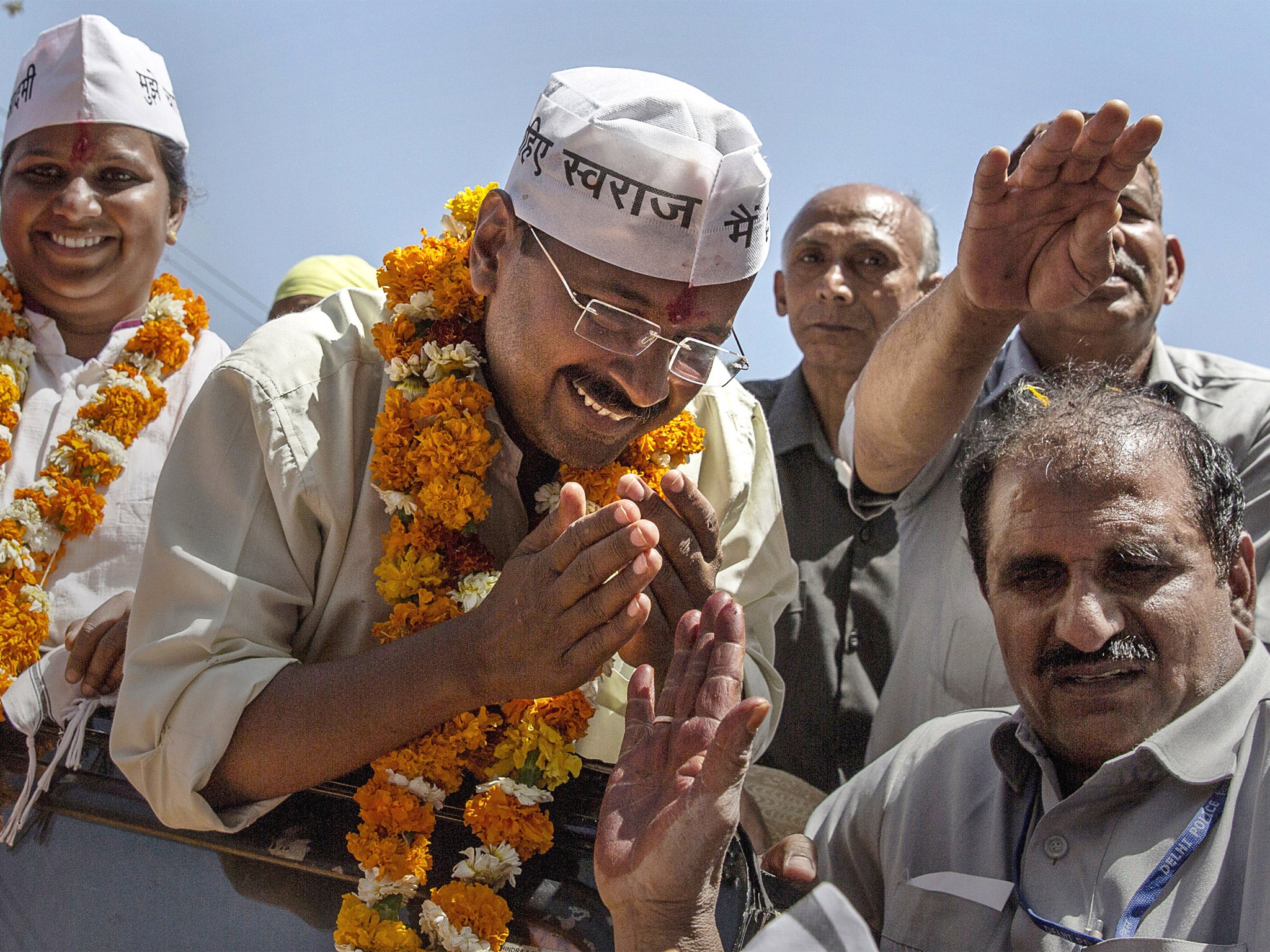Fears for safety of India's election candidates as anti-corruption campaigner attacked again

An anti-corruption campaigner targeting the frontrunner in India’s election campaign said he feared he might be killed after he was attacked for the second time in five days.
Arvind Kejriwal, who heads a grass-roots party highlighting corruption in the country, was assaulted by a man while campaigning in north west Delhi. Five days ago he was similarly attacked by a 19-year-old student. He has also had ink thrown over him several times while on the campaign trail.
Local television channels broadcast footage of a man reaching out to Mr Kejriwal with a garland of flowers, drooping them over his lowered head and then slapping him in the left side of the head with an open palm.
The 38-year-old man, a rickshaw driver, was dragged away by party supporters and himself beaten. As he was later taken away by police, he claimed Mr Kejriwal had broken promises that he had made to voters.
Yet in the aftermath of the attack, Mr Kejriwal appeared to suggest the attacks were directed by the Bharatiya Janata Party, (BJP) whose candidate, Narendra Modi, is considered the frontrunner as India embarks on a month of voting to elect a new government.
“I do not understand why some people resort to violence for becoming the Prime Minister. If you think by attacking us, we will keep quite then you are wrong. We will fight this battle till the last breath,” Mr Kejriwal told the media after composing himself by meditating at the spot where Mohandas Gandhi was cremated in 1948. “In the coming days, I fear more attacks on me. I might also be killed.”
Voting for India’s election, believed by a many analysts to be the most significant in more than three decades, finally got underway this week. The first of nine days of voting saw people cast their ballots in two north-eastern states and more there will vote on Wednesday. An even greater number of voters, in 92 constituencies, will vote in the third phase on Thursday. Among them will be voters in Delhi.
The election campaign has become increasingly toxic with rival candidates hurling abuse and accusations. Mr Kejriwal, who heads the Common Man Party (AAP), has been jostled, insulted and now punched twice.
In line with his efforts to reach out to the poor and lower middle class – the sort of people who saw his party stun the nation by securing power in Delhi in a local election last year - he has tried to minimise his security detail.
Unlike many politicians, who appear to enjoy the supposed status that goes with large convoys of vehicles with flashing lights and protection teams, Mr Kejriwal has opted for as little as possible. He also insists on walking around neighbourhoods and talking to voters.
Many of Mr Kejriwal’s supporters believe he is particularly vulnerable because he has repeatedly condemned powerful corporate and industrial interests. He has also announced he will personally contest the election in Varanasi, the sacred city on the Ganges from where Narendra Modi will also run.
Ajay Gudavarthy, a political scientist at Delhi’s Jawaharlal Nehru University, said various factors might be involved in the attack on Mr Kejriwal, including disgruntlement among elements of the police and other politicians who realise the AAP leader has opted not to have a large security retinue.
“One doesn’t know who is behind all this. There is also the fact that there is general public discontent,” he said. “It’s an easy way to vent one’s anger by attacking a senior political figure.”
India knows better than to take such issues lightly. Former Prime Minister Rajiv Gandhi was killed by assassins from the Liberation Tigers of Tamil Eelam while campaigning ahead of elections in May 1991. His mother, Indira Gandhi, was also assassinated, by her two Sikh bodyguards seeking revenge for an India army operation on the sacred Golden Temple
When Mr Gandhi was killed close to the southern city of Chennai, the killer, Thenmozhi Rajaratnam, bent to touch his feet in a supposed sign of respect before detonating a suicide-bomb belt. The attack was carried out because of India’s controversial peacekeeping role during Sri Lanka’s civil war, something that took place when Mr Gandhi was prime minister.
Last year, the BJP demanded the central government provide additional security for Mr Modi after small explosive devices went off at a rally he was addressing in Patna in Bihar.
Professor Katharine Adeney, a South Asia specialist at Nottingham University, said such attacks appeared to be increasing in recent years.
She said: "The coordination and frequency of these attacks does appear to be more unusual; Kejriwal has alleged that there is a conspiracy behind them. Obviously Kejriwal has upset some vested interests with his anti-corruption message," she said. "However these types of attacks are not likely to hurt his standing in the polls - they increase the perception of him as an outsider and a martyr."
Subscribe to Independent Premium to bookmark this article
Want to bookmark your favourite articles and stories to read or reference later? Start your Independent Premium subscription today.

Join our commenting forum
Join thought-provoking conversations, follow other Independent readers and see their replies